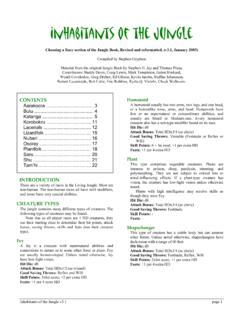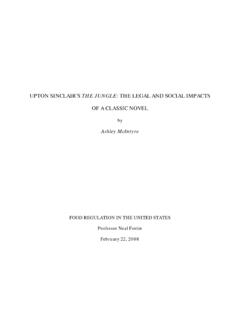Transcription of The Jungle, Chapter 5 (excerpt) - lith115.class.uic.edu
1 1 The jungle , Chapter 5 (excerpt) All of these were sinister incidents; but they were trifles compared to what Jurgis saw with his own eyes before long. One curious thing he had noticed, the very first day, in his profession of shoveler of guts; which was the sharp trick of the floor bosses whenever there chanced to come a slunk calf. Any man who knows anything about butchering knows that the flesh of a cow that is about to calve, or has just calved, is not fit for food. A good many of these came every day to the packing houses and, of course, if they had chosen, it would have been an easy matter for the packers to keep them till they were fit for food.
2 But for the saving of time and fodder, it was the law that cows of that sort came along with the others, and whoever noticed it would tell the boss, and the boss would start up a conversation with the government inspector, and the two would stroll away. So in a trice the carcass of the cow would be cleaned out, and entrails would have vanished; it was Jurgis task to slide them into the trap, calves and all, and on the floor below they took out these slunk calves, and butchered them for meat, and used even the skins of them.
3 One day a man slipped and hurt his leg; and that afternoon, when the last of the cattle had been disposed of, and the men were leaving, Jurgis was ordered to remain and do some special work which this injured man had usually done. It was late, almost dark, and the government inspectors had all gone, and there were only a dozen or two of men on the floor. That day they had killed about four thousand cattle, and these cattle had come in freight trains from far states, and some of them had got hurt. There were some with broken legs, and some with gored sides; there were some that had died, from what cause no one could say; and they were all to be disposed of, here in darkness and silence.
4 Downers, the men called them; and the packing house had a special elevator upon which they were raised to the killing beds, where the gang proceeded to handle them, with an air of businesslike nonchalance which said plainer than any words that it was a matter of everyday routine. It took a couple of hours to get them out of the way, and in the end Jurgis saw them go into the chilling rooms with the rest of the meat, being carefully scattered here and there so that they could not be identified. When he came home that night he was in a very somber mood, having begun to see at last how those might be right who had laughed at him for his faith in America.
5 2 The jungle , Chapter 14 (excerpt) With one member trimming beef in a cannery, and another working in a sausage factory, the family had a first hand knowledge of the great majority of Packingtown swindles. For it was the custom, as they found, whenever meat was so spoiled that it could not be used for anything else, either to can it or else to chop it up into sausage. With what had been told them by Jonas, who had worked in the pickle rooms, they could now study the whole of the spoiled meat industry on the inside, and read a new and grim meaning into that old Packingtown jest that they use everything of the pig except the squeal.
6 Jonas had told them how the meat that was taken out of pickle would often be found sour, and how they would rub it up with soda to take away the smell, and sell it to be eaten on free lunch counters; also of all the miracles of chemistry which they performed, giving to any sort of meat, fresh or salted, whole or chopped, any color and any flavor and any odor they chose. In the pickling of hams they had an ingenious apparatus, by which they saved time and increased the capacity of the plant a machine consisting of a hollow needle attached to a pump; by plunging this needle into the meat and working with his foot, a man could fill a ham with pickle in a few seconds.
7 And yet, in spite of this, there would be hams found spoiled, some of them with an odor so bad that a man could hardly bear to be in the room with them. To pump into these the packers had a second and much stronger pickle which destroyed the odor a process known to the workers as giving them thirty per cent. Also, after the hams had been smoked, there would be found some that had gone to the bad. Formerly these had been sold as Number Three Grade, but later on some ingenious person had hit upon a new device, and now they would extract the bone, about which the bad part generally lay, and insert in the hole a white hot iron.
8 After this invention there was no longer Number One, Two, and Three Grade there was only Number One Grade. The packers were always originating such schemes they had what they called boneless hams, which were all the odds and ends of pork stuffed into casings; and California hams, which were the shoulders, with big knuckle joints, and nearly all the meat cut out; and fancy skinned hams, which were made of the oldest hogs, whose skins were so heavy and coarse that no one would buy them that is, until they had been cooked and chopped fine and labeled head cheese!
9 It was only when the whole ham was spoiled that it came into the department of Elzbieta. Cut up by the two thousand revolutions a minute flyers, and mixed with half a ton of other meat, no odor that ever was in a ham could make any 3difference. There was never the least attention paid to what was cut up for sausage; there would come all the way back from Europe old sausage that had been rejected, and that was moldy and white it would be dosed with borax and glycerine, and dumped into the hoppers, and made over again for home consumption.
10 There would be meat that had tumbled out on the floor, in the dirt and sawdust, where the workers had tramped and spit uncounted billions of consumption germs. There would be meat stored in great piles in rooms; and the water from leaky roofs would drip over it, and thousands of rats would race about on it. It was too dark in these storage places to see well, but a man could run his hand over these piles of meat and sweep off handfuls of the dried dung of rats. These rats were nuisances, and the packers would put poisoned bread out for them; they would die, and then rats, bread, and meat would go into the hoppers together.









